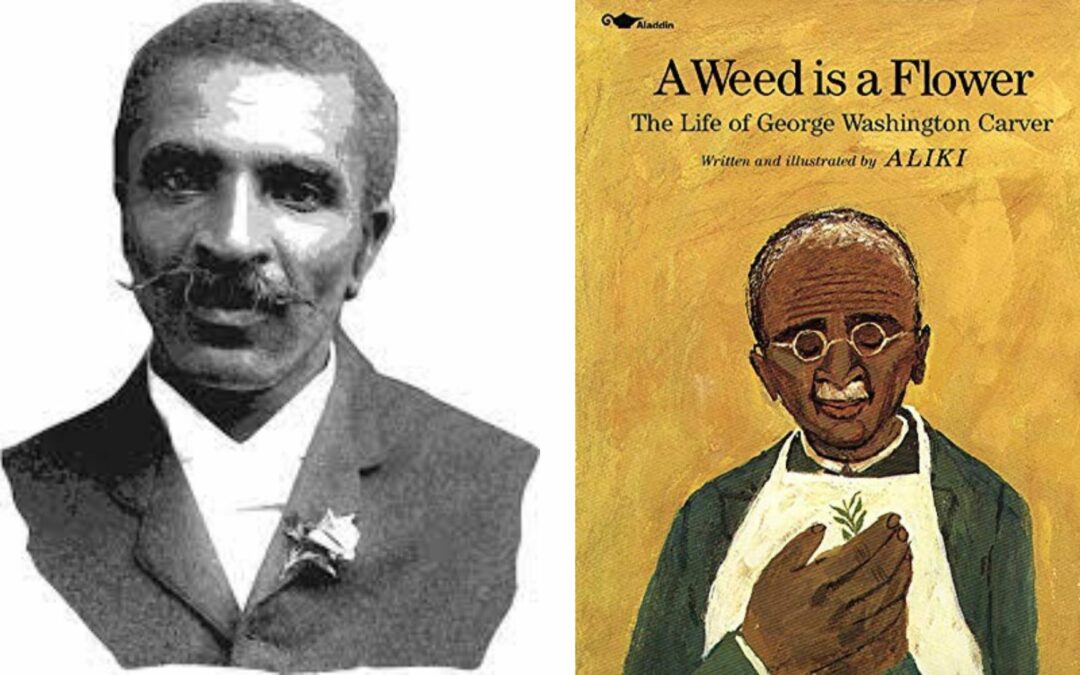Book Review: A Weed is a Flower by Aliki (Black History)
 Author Aliki
Author Aliki
When I was growing up in the 1980s, the author-illustrator Aliki was a staple of children’s literature. No subject seemed outside the scope of this mononymous author’s vision: books about the body, paleontology, mummification, medieval feasts, manners, Shakespeare, Christmas, and various biographical tales as well.
The only thread that seemed to unify these diverse books was Aliki’s characteristic illustration style: a broad stroke, thick paint style that creates impressionistic images reminiscent of Eric Carle’s work. I was always deeply appreciative of Aliki’s books; to this day I still have Dinosaurs Are Different on the kids’ section of my bookshelf.
I’ll admit, when I was a kid, I had no idea if Aliki was male or female, American or from some exotic country. Now I know that she is Aliki Brandenberg, a Greek-American from Jersey who now resides in London.
The Life of George Washington Carver
Today I’m reviewing one of her well-known biographical picture book for Black History Month: A Weed is a Flower: The Life of George Washingon Carver. Published by Aladdin Paperbacks, this book first hit shelves back in 1965, during the high point of the Civil Rights Movement. A Weed is a Flower takes readers through the life of the famed agricultural scientist who popularized the utility of the peanut int he late 19th-early 20th centuries.
George Washington Carver (1864-1943) was born into slavery in Missouri. After the end of the Civil War and emancipation, Carver traveled and worked while perfecting his skills as a master gardener, becoming known as the “Plant Doctor.”
Carver eventually attended Simpson College in Iowa—one of the rare colleges that admitted black students in those days—where he studied agriculture. He amassed an encyclopedic amount of knowledge about plants, flowers, and soil. The title of Aliki’s book is taken from one of Carver’s sayings, “A weed is a flower growing in the wrong place.”
Carver is best known for promoting the peanut, which he believed was vastly underutilized. He promoted peanut farming in order to diversify the farms of black cotton planters. This was coupled with aggressive promotion of new uses for the peanut: paper, ink, shaving cream, sauces, linoleum, shampoo, and even milk. It is said that Carver found over 300 new uses for the peanut.
A Weed is a Flower
In writing a book about someone like Carver, it is difficult to balance emphasis between his accomplishments as a scientist and his importance as an icon of the black community during the segregation era.
Aliki’s book primarily focuses on Carver’s scientific importance, highlighting his unquenchable curiosity as the font of his intellectual achievements. That’s not to say racial themes are ignored; they are certainly not. Carver’s birth into slavery, his difficulty finding an institute of higher education that would accept blacks, and his desire to help the condition of poor African-American farmers all play into the story. They are integrated skillfully into the narrative of Carver’s life, educating young readers about life under slavery and segregation without detracting from the narrative about Carver’s scientific ambitions.
I think that this picture book is very well done. Apparently others also think this as it was reissued in 1988 and continues in circulation to this day. The book is advertised for ages 4 to 8 and I think the writing style is spot on for this age group.
Aliki’s illustrations are… an acquired taste. Earlier I compared them to Eric Carle ( of The Very Hungry Caterpillar fame). Like Eric Carle, you’re either going to deeply appreciate the eccentricity of Aliki’s art, or you’re going to find it a little stiff and jagged. I fall into the former category; even though the style lends itself to a certain stiffness of form, Aliki knows how to use color, arrangement, and movement to embue the scenes with emotion despite the sometimes rigid appearance of the characters.
I recommend A Weed is a Flower as a book that shares an inspiring story about one of America’s great agriculturalists while communicating important information about the segregation era. It would be a good addition to any Catholic homeschool bookshelf.
As an Amazon Associate I earn from qualifying purchases.






